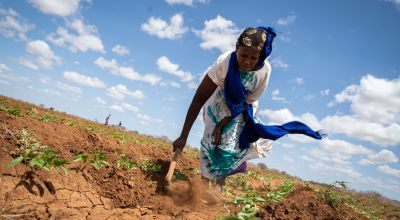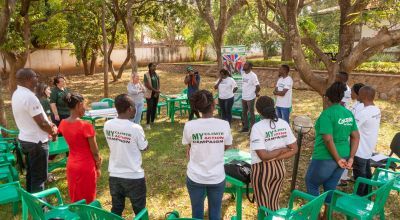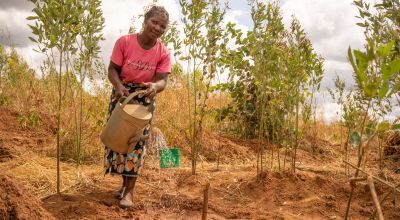
Read our 2024 annual report

Knowledge Hub
About a five-hour drive from the bustling capital city of Malawi, Lilongwe, there is a small village in Neno District, near Mwanza, called Samu. Samu village is full of tumbling hills, rows of maize, vast fields and ponds brimming with fish and nutrients, all alongside the Sayamika River.
The crops and nature on display are the result of the hard work of the Sayamika Catchment Conservation Group. The group, made up of 12 men and 18 women, was formed in 2013 with a purpose - to conserve the Sayamika River and its surrounding fields.
This is no mean feat. Malawi is one of the top 10 countries in the world most affected by climate change. This is due to a number of reasons. Firstly, Malawi massively depends on agriculture. Over 80% of the population is employed by the agriculture industry, with many families relying on subsistence farming - that is, growing enough to meet their own needs - to put food on the table. However, this means that Malawi is especially vulnerable to climate shocks, such as cyclones.
Southern Malawi was devastated by Cyclone Ana in early 2022, which caused widespread flooding and impacted the national electricity supply. Malawi was also at the epicentre of 2019’s Cyclone Idai, which United Nations Secretary General António Guterres called “one of the worst weather-related catastrophes in the history of Africa”. Overall, Idai affected 3 million people, killed over 1,000, and caused €2.1 billion in damages.
Increasing weather extremes have contributed to the country’s poverty and hunger rates. While Idai’s flood waters destroyed crops for many, unpredictable rainfalls and droughts pose greater threats to the country’s agricultural industry. While Malawi’s rainy season usually spans from October to April, the 2022 rainy season had a poor start, with rains not beginning until January and even then being below-average for many parts of the country. This led to delayed, reduced or even destroyed harvests for farmers. This level of uncertainty around their livelihoods means that families cannot rely on their harvests to feed themselves and provide a guaranteed income.
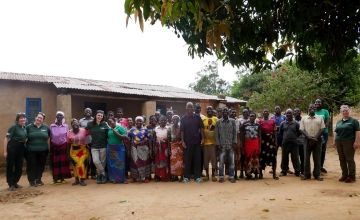
All of these factors, teamed with a lack of training, tools and seeds, mean that conserving an area like Samu village and producing sustainable crops are difficult tasks. Concern Worldwide has been working with the Sayamika Catchment Conservation Group since 2021 as part of our mission to help people living in extreme poverty to achieve major improvements in their lives, which can be sustained without ongoing support from Concern by building resilience and engaging in long-term development work.
Concern staff, accompanied by Irish presenter, influencer and climate activist Fionnuala Moran, visited Samu village in Malawi as part of the European Union and Irish Aid-funded 1Planet4All campaign, to see the climate-smart techniques they have been using to conserve the land and water, and to fight against the effects of climate change.
Climate smart crops
In working with the farmer group, Concern has provided tools like hoes, picks, hammers, polythene tubes, drums and agroforestry seeds, and worked with local government to coordinate with the farmers. We also provided training to the lead farmers in the group on climate smart agriculture techniques, and how not to rely on one crop, such as maize, but to diversify their crops.
Lucia Tebulo, 40, is one of the farmers who has taken that training on board. The mother-of-six, alongside one of the group’s lead farmers, is leading a demonstration in Samu village on using an innovative irrigation system for their crops.
Diversity in crops is essential to a nutritious diet. That is why as well as planting maize, their staple crop, Lucia planted Irish potatoes. Many Malawians refer to potatoes as Irish to differentiate them from sweet potatoes, and it’s a popular crop as potatoes are nutritious, less labour intensive to grow, and fast-growing; ensuring that farmers like Lucia don’t have to wait too long for a harvest.
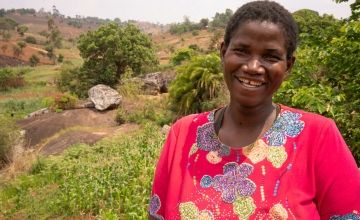
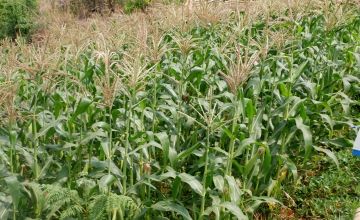
“We grow different crops with assistance from Concern Worldwide,” Lucia explained. “We have harvested twice this year. After harvesting maize, we planted Irish potatoes.”
However, in order to harvest their crops, farmers need to ensure that the soil is fertile. Due to changing rainfalls in Malawi, water shortage is a big problem for farmers like Lucia. So, the Sayamika Catchment Conservation Group, with help from Concern, came up with a way to irrigate their crops.
Lucia told us: “Due to climate change, we have experienced water shortage. We came up with an idea for irrigation, so we can harvest more. We use plastic paper to hold back the water so there is no soil erosion. The water flows on top of the plastic. This system of planting crops at the irrigation site helps us a lot, because we harvest a lot from a small portion of land. We can sell our crops and use the money to buy seeds to plant during the rainy season.”
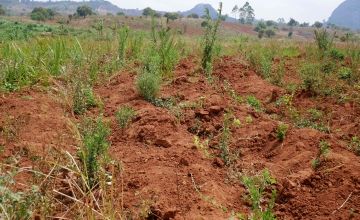
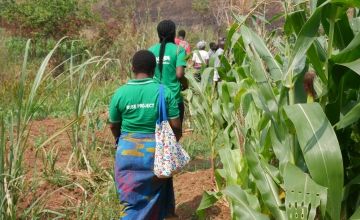
Samu village is a perfect example of beneficiaries taking the training, tools and seeds provided by Concern and using them to create a resilient and sustainable agricultural system. We met lead farmers Foster Kalipande, 24, and Annie Yohane, 28, who are part of a further club in Samu village, made up of 20 men and 25 women, who are growing their own seedlings in a nursery to benefit the area. This nursery is made up of 625 separate polythene tubes, which are packed with a mixture of soil, manure and rainwater. The tubes, which were provided by Concern, were then used to plant seeds - mainly gliricidia and vetiver grass.
The leaf of gliricidia, a rapidly growing thornless tree, can be used for fertiliser, which leads to higher crop productivity and yields. Due to its strength, it can also be used as a sort of living fence, a support tree for different crops such as sweet potatoes and peppers. Meanwhile, the deep roots of vetiver grass make it perfect to stabilise terraces and crops, and also protects soil from erosion. This is because its roots bind to the soil and slow water flow, resulting in more moisture being absorbed by the soil.
Annie, carrying her infant daughter Esther, explained that they water the seeds every morning and evening “so we can restore the soil fertility in our farms and protect the area against the effects of climate change.”
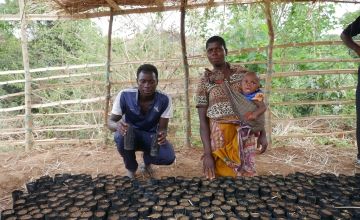
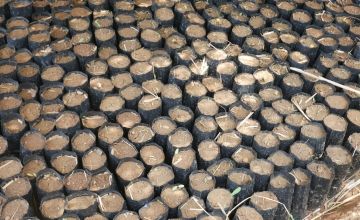
Foster added: “Concern provided some of the materials we use to manage this nursery, such as sickles, hoes and watering cans, and the plastic tubes. We also got materials to construct check dams. Concern provided capacity building in collaboration with the government to give us technical know-how to manage these nurseries.”
It will take a number of years for these seedlings to reach their full potential, but Foster and Annie, who have shared their knowledge with other members of the club, already have plans far beyond the nursery and what they have learned. They have reserved some of the plastic tubing so they can grow fruit trees, which will help control the winds so that the environment will be more conducive to planting. They will also sell those fruits, and use that money to buy more tubes and other materials — resulting in a sustainable practice.
Foster explained: “This is not the end. We have plans to come up with a number of tubes to fill and plant to cover the area. We have plans to extend after Concern leaves this area. We now know what to do. Before Concern arrived, we had planted other trees in the orchard, which shows the sustainability of what we are doing.”
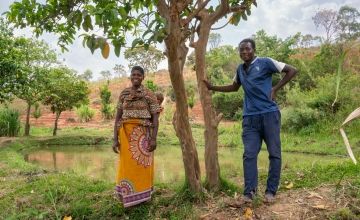
Sustainable fish farming
As well as diversifying crops in arable farming, it is important for farmers in environments like Malawi to diversify in their techniques. In 2005, the first dam was constructed in the area to allow farmers to diversify into fish farming, but due to soil erosion, they found that their ponds kept being swept away.
However, after learning about climate smart agriculture and adapting to the effects of climate change from Concern, the farmers were able to implement new techniques to protect their ponds. Among them is Kosimasi Salijeni, the lead farmer of the Magwuro Fisheries Club, which has 14 members. He told us that after learning that nature was changing, so they should change their farms, the club implemented new techniques to improve their ponds and dams.
The 37-year-old said: “In the past, indeed we had problems. Because when we talk about human health, it is the same with soil. If a person is suffering from diarrhoea, he loses water. Eventually, the person starves. So our land in the past, was a land that was losing water. There were no appropriate farm terraces. There were no swales. Now that we have constructed box ridges, made swales, changed ridges into 25 cm and we are planting one maize per station. Our soil has become stable. It is no longer losing water. This has helped us to improve a lot.”
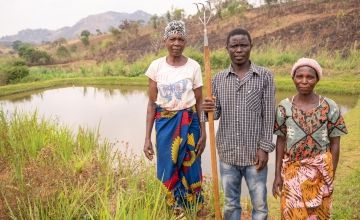
As well as receiving necessary tools for farming, like hoes, slashers, picks, watering cans, wheelbarrows, hammers, tape measures and drums, the farmers have learned how to make organic fertiliser from Concern. One of these fertilisers, Mbeya, is made from maize bran and animal dung, and is not only quick to make, it is a cheap and sustainable alternative to more expensive chemical fertilisers.
Marita Kaferapantira and his wife Kieanzi have seen the benefits of also making their own fish food. Marita showed us the mixture he prepares, which is made from soy, cooking oil, maize bran, wheat flour and ground small fish. It takes him an hour to make 25kg of the mixture, which lasts him nearly a month, putting 500g of the food in the pond every morning and 500g every night. This food feeds around 75kg of fish - mostly shirana, a mild-flavoured white fish - which Marita and Kieanzi can then sell at the market for 3,000 Malawian kwacha (€2.77) per kilo.
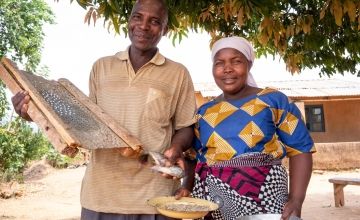
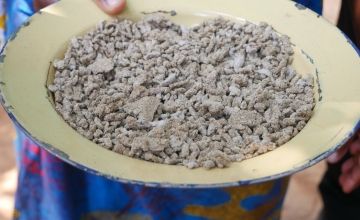
Kosimasi knows that this practice is part of what makes the Sayamika Catchment Conservation Group’s activities so sustainable. He said: “There is a big connection. The connection that exists with the pond is that we use this water for irrigation. Because inside the pond we put manure, the water has some nutrients which are applied in the uplands. In the uplands we harvest crops like maize. When we remove the maize bran, we use it to make fish feed. We make the feed for the fish by taking some of the small fish, drying them, we ground the fish. We also use maize, soya, flour and cooking oil. They are the ingredients we use to make the feed for the fish. With this feed, we can feed the fish for six months. It is a big fish after six months, which customers at the market appreciate.
“Everything is connected. We are using the fish pond to irrigate our crops on the land, and we are using the same fish to make the feed for the fish. We are not devastating the environment, we are busy taking care of the environment.”
Kosimasi said that prior to fish farming, he struggled to pay for school fees for his three children, who he shares with his wife Jenipher. But now, he has even managed to pay for his younger brother - who is now in form 4 - to attend school by selling the fish he produces in the dam. He shared: “From fish farming, I have built a house where I am sleeping now. I roofed it with metal sheets using the benefits from fish farming. I have my own two ponds which are large enough. They are 200 square metres each. Hence I have benefited a lot from fish farming. On the issue of food, because of fish farming, I am not struggling (for food) at all.”
And Kosimasi is far from the only farmer to benefit. Other farmers in the area have seen the results of these sustainable farming methods, and have got involved themselves - 38 of them in fact, with 15 women and 23 men working across 65 new dams. “The demand for the fish market is very high because there are few farmers with fish ponds, so we want more farmers to get involved in that. The ponds that we have constructed from the school pond, they are in total 65 ponds. They have benefited a lot. Because in terms of food like fish, they are not struggling to find it. They go in their ponds when they want relish. When money isn’t available, they just go in the pond without any difficulties. So this has helped many people to improve significantly. Among the 38 farmers we have, they see that they are improving.”
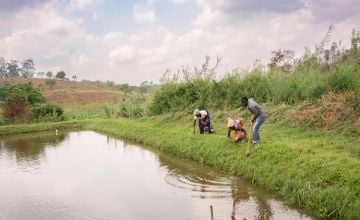
Not only have the new techniques resulted in increased income due to increased yields, Kosimasi and his family’s diets are more nutritious, as they are diversifying what they eat thanks to more crops in their home gardens. “Significantly, things have changed. Many things have changed since [Concern] gave us the support. They taught us and we started growing vegetables. We are growing tomatoes, even maize. We are growing different crops, and fish too. All these with the purpose of easy access to nutrition in our households. All the crops Concern has taught us that everyone should have a home garden, to make sure that vegetables are available at home. We irrigate a home garden, in order to ensure good nutrition.
“We might say our lives have changed because we are not struggling with the work we do, because everything that a farmer needs they gave us. They gave us hoes, slashers, picks and tape measures. Everything that is used by a farmer, Concern gave us. So our lives have changed very much.”
Most importantly, though, is that farmers like Kosimasi are now able to adapt to the changing climate in Malawi, and its effects on their livelihoods. The Sayamika Catchment Conservation Group is not only using climate smart agriculture techniques to produce bigger harvests and make more money, but to protect the precious land and water around them.
Kosimasi said: “What [Concern] have helped us to implement, based on how our climate has changed, is that we should encourage people to plant trees for soil protective cover, planting trees along river banks so that our soil should be stable. In addition, establishing home gardens so that food shouldn’t be scarce, since for a human life, for one to stay alive, he must find enough food and money. So in all these things Concern has instructed us that, ‘if you have enough food and money; your lives will change a lot.’ These are the things that Concern has informed us and that’s what we are doing now.
“They helped us a lot with trainings. Our group is a catchment protection group. We are many people. The catchment concerns the rivers that we have here and how they flow. The need is that everyone must protect them. When the upper lands are protected, our rivers are going to be protected as well. That is what Concern has instructed us to be able to do.”
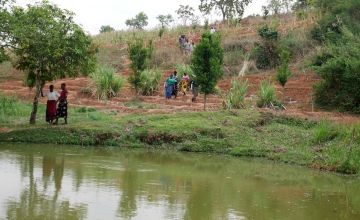
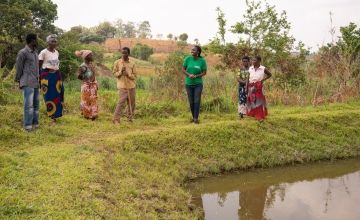
"A wonderful way to build climate resilience"
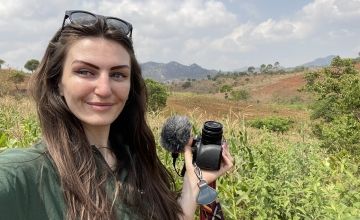
As part of the 1Planet4All trip to Malawi, Fionnuala Moran joined the Concern team to visit our areas of work. Fionnuala is an Irish presenter and influencer who uses her social media channels and work in the Irish media to speak about sustainability and climate activism — for example, how to reduce fast fashion consumption, and how to eat seasonally. In addition, she has recently completed her master’s in Climate Change: Policy, Media and Society.
As well as meeting young activists in Lilongwe who are campaigning for climate justice, Fionnuala saw the work of the Samu village farmers, and was impressed by how they were empowering themselves through the training they received from Concern.
"It was incredible to see how Concern equipped extremely remote Malawian communities with climate smart agriculture solutions,” Fionnuala said. “A journey along barely-there roads deep into Malawi’s mountainous countryside bordering Mozambique brought us to Samu village. We were warmly greeted and having scaled up extremely steep roads for hours, it was fascinating to see a fish farm atop the mountains. This was man-made and a totally new income stream for this community.
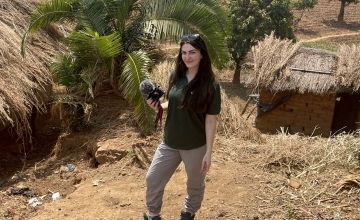
“To have a reliable income source from the fish farm should crops fail due to extreme weather was a wonderful way to build the climate resilience of these rural farmers. Concern has put into action the parable about teaching a person how to fish being so much more powerful than simply giving a person a fish.
“The way knowledge sharing empowered others in the community was fantastic too. The lead farmers received training from Concern and then passed their learnings on to other farmers, meaning this project can be replicated elsewhere, protecting even more communities from food insecurity — a climate impact the people of Malawi told us they were very apprehensive about. Similar training was provided to give the Samu village irrigation ponds which were extremely valuable during ever-increasing droughts.”
She added: “By helping the Samu community protect themselves against many of the climate change impacts they are experiencing, Concern has made an invaluable impact."
Organisations who fund us



